
Opera is a form of theatre in which music is a fundamental component and dramatic roles are taken by singers. Such a "work" is typically a collaboration between a composer and a librettist and incorporates a number of the performing arts, such as acting, scenery, costume, and sometimes dance or ballet. The performance is typically given in an opera house, accompanied by an orchestra or smaller musical ensemble, which since the early 19th century has been led by a conductor. Although musical theatre is closely related to opera, the two are considered to be distinct from one another.
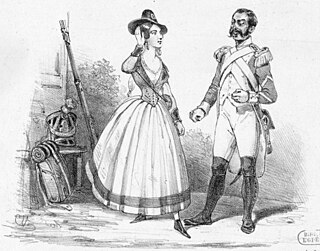
La fille du régiment is an opéra comique in two acts by Gaetano Donizetti, set to a French libretto by Jules-Henri Vernoy de Saint-Georges and Jean-François Bayard. It was first performed on 11 February 1840 by the Paris Opéra-Comique at the Salle de la Bourse.

A Midsummer Night's Dream is a comedy play written by William Shakespeare in about 1595 or 1596. The play is set in Athens, and consists of several subplots that revolve around the marriage of Theseus and Hippolyta. One subplot involves a conflict among four Athenian lovers. Another follows a group of six amateur actors rehearsing the play which they are to perform before the wedding. Both groups find themselves in a forest inhabited by fairies who manipulate the humans and are engaged in their own domestic intrigue. A Midsummer Night's Dream is one of Shakespeare's most popular and widely performed plays.
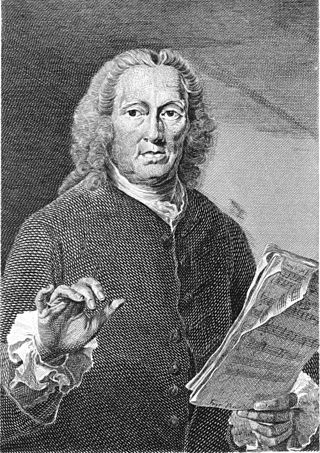
Richard Leveridge was an English bass singer of the London stage and a composer of baroque music, including many popular songs.
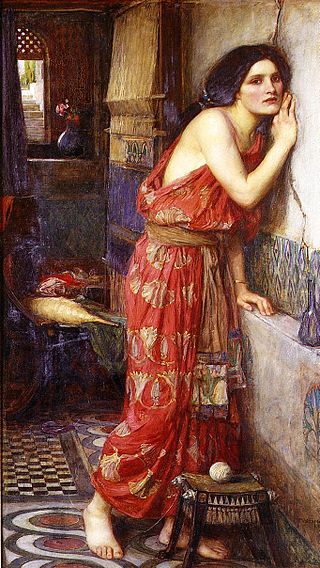
Pyramus and Thisbe are a pair of legendary, ill-fated lovers from Babylon whose story forms part of Ovid's Metamorphoses. The story has been retold by many authors.
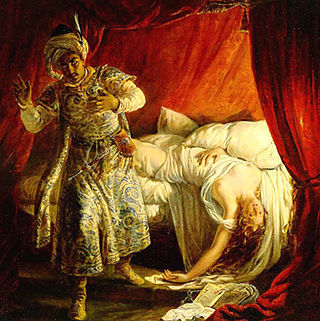
Otello is an opera in four acts by Giuseppe Verdi to an Italian libretto by Arrigo Boito, based on Shakespeare's play Othello. It was Verdi's penultimate opera, first performed at the Teatro alla Scala, Milan, on 5 February 1887.

Orfeo ed Euridice is an opera composed by Christoph Willibald Gluck, based on the myth of Orpheus and set to a libretto by Ranieri de' Calzabigi. It belongs to the genre of the azione teatrale, meaning an opera on a mythological subject with choruses and dancing. The piece was first performed at the Burgtheater in Vienna on 5 October 1762, in the presence of Empress Maria Theresa. Orfeo ed Euridice is the first of Gluck's "reform" operas, in which he attempted to replace the abstruse plots and overly complex music of opera seria with a "noble simplicity" in both the music and the drama.
The history of opera in the English language commences in the 17th century.
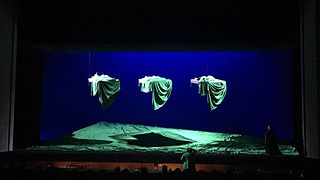
A Midsummer Night's Dream, Op. 64, is an opera with music by Benjamin Britten and set to a libretto adapted by the composer and Peter Pears from William Shakespeare's play, A Midsummer Night's Dream. It was premiered on 11 June 1960 at the Aldeburgh Festival, conducted by the composer and with set and costume designs by Carl Toms. Stylistically, the work is typical of Britten, with a highly individual sound-world – not strikingly dissonant or atonal, but replete with subtly atmospheric harmonies and tone painting. The role of Oberon was composed for the countertenor Alfred Deller. Atypically for Britten, the opera did not include a leading role for his partner Pears, who instead was given the comic drag role of Flute/Thisbe.
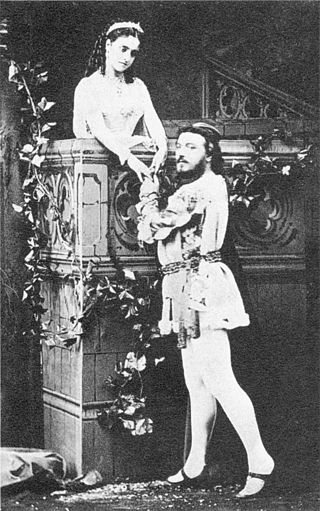
Roméo et Juliette is an opera in five acts by Charles Gounod to a French libretto by Jules Barbier and Michel Carré, based on Romeo and Juliet by William Shakespeare. It was first performed at the Théâtre Lyrique, Paris on 27 April 1867. This opera is notable for the series of four duets for the main characters and the waltz song "Je veux vivre" for the soprano.

John Frederick Lampe was a musician and composer.

Macbeth is an opera in four acts by Giuseppe Verdi, with an Italian libretto by Francesco Maria Piave and additions by Andrea Maffei, based on William Shakespeare's play of the same name. Written for the Teatro della Pergola in Florence, Macbeth was Verdi's tenth opera and premiered on 14 March 1847. It was the first Shakespeare play that Verdi adapted for the operatic stage. Almost twenty years later, Macbeth was revised and expanded into a French version and given in Paris on 21 April 1865.
"Ombra mai fu", also known as "Largo from Xerxes" or "Handel's Largo", is the opening aria from the opera Serse (1738) by George Frideric Handel.

Sir Henry Rowley Bishop was an English composer from the early Romantic era. He is most famous for the songs "Home! Sweet Home!" and "Lo! Hear the Gentle Lark." He was the composer or arranger of some 120 dramatic works, including 80 operas, light operas, cantatas, and ballets. Bishop was Knighted in 1842. Bishop worked for all the major theatres of London in his era – including the Royal Opera House at Covent Garden, the Theatre Royal, Drury Lane, Vauxhall Gardens and the Haymarket Theatre, and was Professor of Music at the universities of Edinburgh and Oxford. His second wife was the noted soprano Anna Bishop, who scandalised British society by leaving him and conducting an open liaison with the harpist Nicolas-Charles Bochsa until the latter's death in Sydney.

Lotario is an opera seria in three acts by George Frideric Handel. The Italian-language libretto was adapted from Antonio Salvi's Adelaide.The opera was first given at the King's Theatre in London on 2 December 1729.

French opera is both the art of opera in France and opera in the French language. It is one of Europe's most important operatic traditions, containing works by composers of the stature of Rameau, Berlioz, Gounod, Bizet, Massenet, Debussy, Ravel, Poulenc and Messiaen. Many foreign-born composers have played a part in the French tradition, including Lully, Gluck, Salieri, Cherubini, Spontini, Meyerbeer, Rossini, Donizetti, Verdi and Offenbach.

Piramo e Tisbe is an opera in two acts, described by its composer as an intermezzo tragico, by Johann Adolf Hasse to a libretto by Marco Coltellini.
Isabella Lampe was an English operatic soprano and the wife of composer John Frederick Lampe. She sang primarily in works by her husband and was part of a well-known English family of musicians, the Young family, that included several professional singers and organists during the 17th and 18th centuries.

Giulia Frasi was born c. 1730 and died in 1772 or after May 1774. She was an Italian soprano who was primarily active in London. She sang in every one of Handel's English oratorios, including various world premières for which the composer wrote roles specifically for her.